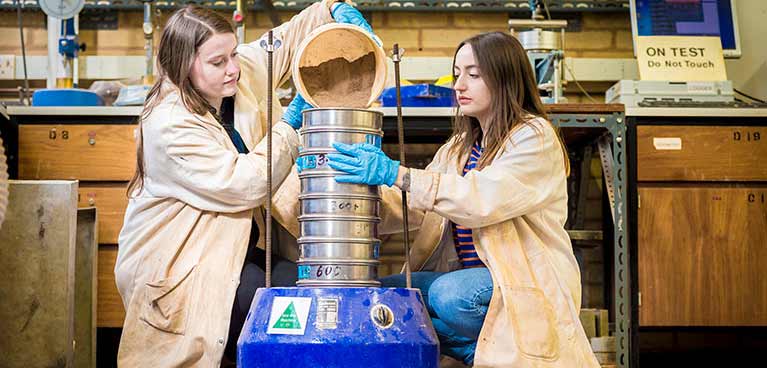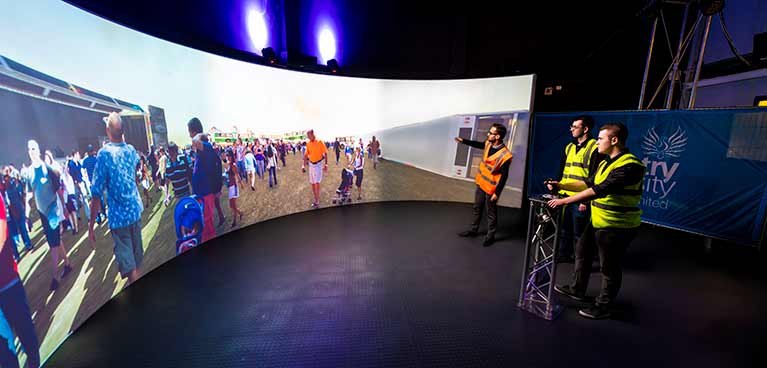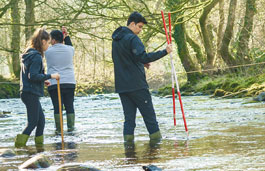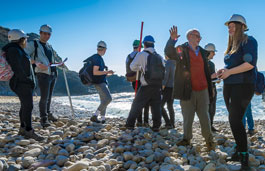Search
Disaster and Emergency Management BSc (Hons)
Study level: Undergraduate
As the world faces an increasing number of natural and anthropogenic disasters as well as complex emergencies such as climate change, food insecurity and conflict, the need for effective disaster risk reduction and management has become a global challenge.
Course features
Course option
Year of entry
Location
Coventry University (Coventry)
Study mode
Full-time
Part-time
Sandwich
Duration
3 years full-time
4 years full-time (study abroad or work placement)
6 years part-time
UCAS codes
N252
Start date
September 2024
Course overview
This course is aimed at those with little or no experience of the sector but with a strong vocation to work to improve the capacity and capability of those at risk and supporting organisations.
Our annual intake makes for healthy class sizes.
- Disaster and emergency management professionals play a critical role in lessening the impact of human, technological and environmental catastrophes. Professionals work with numerous partners to quickly and accurately assess situations and communities affected, advising on all aspects of response and recovery, as well as future prevention or management strategies.
- Multidisciplinary in nature, this course draws on aspects of technology, physical science, engineering, sociology and human geography. We also place considerable emphasis on the acquisition of practical skills – from table-top or virtual emergency response scenarios, to laboratory exercises and field-based management of disaster, both in the UK (with Outreach Rescue) and overseas through two mandatory international field trip modules2. See fees and funding section for more details.
- This course is designed to equip you with the necessary knowledge to identify, critically analyse, assess, respond to and recover from a growing range of crisis, emergency and disaster situations and to operate confidently in practitioner, policy and management sectors.
Joint Top Modern University for Career Prospects
Guardian University Guide 2021 and 20225 QS Stars for Teaching and Facilities
QS Stars University RatingsTop 5 UK Student City (Coventry)
QS Best Student Cities Index 2023Why you should study this course
We work collaboratively with agencies across a variety of sectors to develop exciting practical emergency and disaster simulation exercises in our unique Simulation Centre4, and our classrooms. These exercises and other interactive sessions form a major part of the teaching and learning on this programme, with sessions running in every year of the course in this manner.
- The course also includes guest lectures, site visits and field trip practical activities in the UK and internationally allowing students to witness disaster risks and reduction measures in a range of contexts from a variety of organisations who are undertaking this work in the field2.
- Have an opportunity to participate in or design an emergency exercise in the University’s Simulation Centre4.
- Participate in interactive classroom sessions which may include visiting guest speakers from industry, table-top exercises etc2.
- Undertake fieldwork to better understand the risks and challenges faced by communities and disaster and emergency responders in the face of a range of natural and anthropogenic risk situations2.
- Be supported by a scheduled series of academic personal tutorials.
- Be supported to develop your employability and self-marketing skills.
What you'll study
We regularly review our course content, to make it relevant and current for the benefit of our students. For these reasons, course modules may be updated.
How you'll learn
We host expert guest speakers (subject to availability) from industry who talk about their experience and current issues in disaster preparedness and response, humanitarian actions, sustainable development and more2.
We encourage you to join one of our student societies, such as the International Disaster Concern Society (membership fees applicable), which may provide further opportunities to gain real experience of working in the humanitarian sector2. In the past, the Society has organised trips to Tanzania, and to large-scale emergency exercises, as well as organising additional guest speakers. Please note that these activities and any associated additional costs are student-led and independent of the Disaster and Emergency Management course.
This course can be offered on a part-time basis. Whilst we would like to give you all the information about our part-time offering here, it is tailored for each course each year depending on the number of part-time applicants. Therefore, the part-time teaching arrangements vary. Request further information about part-time study.
Teaching contact hours
We understand that everyone learns differently, so each of our courses will consist of structured teaching sessions, which can include:
- On campus lectures, seminars and workshops
- Group work
- Self-directed learning
- Work placement opportunities
The number of contact hours may vary from semester to semester, however, on average, it is likely to be around 14-15 contact hours per week in the first and second year dropping to around 11 contact hours per week in the final year as you become a more independent learner.
In addition, you will be expected to undertake approximately 30-35 hours of self-directed study per week depending on the demands of individual modules. This self-directed learning allows you to use your research skills, consolidate your knowledge or undertake collaborative group work.
As an innovative and enterprising institution, the university may seek to utilise emerging technologies within the student experience. For all courses (whether on-campus, blended, or distance learning), the university may deliver certain contact hours and assessments via online technologies and methods.
Since COVID-19, we have delivered our courses in a variety of forms, in line with public authority guidance, decisions, or orders and we will continue to adapt our delivery as appropriate. Whether on campus or online, our key priority is staff and student safety.
Assessment
This course will be assessed using a variety of methods which will vary depending upon the module.
Assessment methods can include:
- Formal examinations
- Phase tests
- Essays
- Group work
- Presentations
- Reports
- Projects
- Coursework
- Exams
- Individual assignments
- Laboratories
The Coventry University Group assessment strategy ensures that our courses are fairly assessed and allows us to monitor student progression towards achieving the intended learning outcomes.
International experience opportunities
Disasters and emergencies occur all over the world, as such the field as a whole is international in outlook in many ways. Even if you intend to practice in the UK, there are lessons that can be learned from consideration of international case studies and comparing them to practice in the UK. Successful completion of this course will equip you to work in a range of related careers either nationally or internationally.
International fieldwork is a key component in the second and final years of the course. These locations are regularly reviewed (Students have had the opportunity to visit various locations around Turkey)2.
Additionally, many of our students choose to take a placement in industry in between their second and final years. In recent years, students have undertaken placements in Thailand, Sri Lanka, Uganda, Malta and numerous locations around the UK to name but a few2.
Entry requirements
Typical offer for 2024/25 entry.
Not got the required grades? We offer this degree with an integrated foundation year.
Fees and funding
2024/25 tuition fees.
| Student | Full-time | Part-time |
|---|---|---|
| UK, Ireland*, Channel Islands or Isle of Man | £9,250 per year | Request fee information |
| EU | £9,250 per year with EU Support Bursary** £19,850 per year without EU Support Bursary** |
Not available |
| International | £19,850 per year | Not available |
If you choose to do a work placement2, you should consider travel and living costs to cover this. There is also a tuition fee3 of £1,250 that will cover your academic support throughout your placement year.
For advice and guidance on tuition fees and student loans visit our Undergraduate Finance page and see The University’s Tuition Fee and Refund Terms and Conditions.
We offer a range of International scholarships to students all over the world. For more information, visit our International Scholarships page.
Tuition fees cover the cost of your teaching, assessments, facilities and support services. There may be additional costs not covered by this fee such as accommodation and living costs, recommended reading books, stationery, printing and re-assessments should you need them. Find out what's included in your tuition costs.
The following are additional costs not included in the tuition fees:
- Optional international field trips: £400+ per trip.
- Any costs associated with securing, attending or completing a placement (whether in the UK or abroad).
Other additional costs
- Mandatory international field trips: Typically between £200 and £400 per trip
*Irish student fees
The rights of Irish residents to study in the UK are preserved under the Common Travel Area arrangement. If you are an Irish student and meet the residency criteria, you can study in England, pay the same level of tuition fees as English students and utilise the Tuition Fee Loan.
**EU Support Bursary
Following the UK's exit from the European Union, we are offering financial support to all eligible EU students who wish to study an undergraduate or a postgraduate degree with us full-time. This bursary will be used to offset the cost of your tuition fees to bring them in line with that of UK students. Students studying a degree with a foundation year with us are not eligible for the bursary.
Facilities
The £50m Engineering and Computing Building and new £25m Beatrice Shilling Building are designed to support hands-on learning. Our Sir John Laing Building also houses a variety of industry-standard labs and equipment4.

Geotechnics Laboratory
This specialist lab contains triaxial cells, direct shear box apparatus, a dimensional compression oedometer, California Bearing Ratio apparatus, soil classification equipment and Marshall test apparatus for asphalt mixes.

Simulation Centre
Our Simulation Centre uses an interactive screen and real-life scenarios to create a ‘virtual’ training environment. Role-play exercises are part of the course to help prepare you for situations in the workplace.

Informal Study Areas
You will have access to a range of informal study areas. These include hot-desk computers, with access to specialist software you may need for studying, and bookable spaces where you can meet with academics or work in small groups.
Careers and opportunities
On successful completion of the course, you will be able to:
- Critically analyse a range of historical events, conceptual perspectives, models of, and factors which, influence hazard, vulnerability and risk. Apply these and related terms appropriately in various disaster, emergency and crisis related contexts.
- Analyse the benefits and limitations of a range of approaches to risk assessment and utilise them appropriately.
- Evaluate the benefits and challenges of implementing effective risk mitigation.
- Critique approaches to managing residual risks via preparedness systems and emergency planning and propose good practice approaches.
- Assess the need for organisational resilience and good governance in effective disaster, emergency and crisis management.
- Evaluate and apply community centred frameworks for resilience, sustainability and development.
- Have the ability to work effectively with others within the context of multidisciplinary, multiagency teams, respecting inputs from fellow professionals, beneficiaries and other stakeholders and to reflect on one's own performance and role within the team.
- Develop and apply technical and analytical skills to develop practical solutions to challenges faced in disaster and development contexts.
- Become an independent learner, demonstrating high level communication, ethics, research and evaluation skills.
Our blend of academic and practical study seeks to provide you with a specialist understanding of all aspects of disaster management, as well as the specific emergency planning and management skills needed to prepare you for employment in this sector.
The course aims to develop your skills in problem-solving, teamwork and leadership, project management and communication, all of which are qualities employers demand. We strive to produce graduates who can make difficult decisions whilst being culturally sensitive, ethical and compassionate, the capabilities required by international relief and development organisations, private sector consultancies, national government, local authorities and United Nations agencies operating around the world.
Where our graduates work
Recent graduates have gone on to work for the public sector – in the emergency services, the NHS, the Environment Agency, Foreign and Commonwealth Office, Cabinet office, Department for International Development; high risk manufacturing, energy and aviation companies; the military; consultancy with PricewaterhouseCoopers; financial risk, insurance and banking; international disaster risk and response agencies, for example: Asian Disaster Preparedness Center, RedR India, Oxfam GB, and the Catholic Overseas Development Agency (CAFOD).
Graduate Immigration Route visa
Based on current information from the UK Government, international students whose study extends beyond summer 2021 may be eligible for a visa under the UK Government’s Graduate Immigration Route, which will enable students to stay and work, or look for work, in the UK at any skill level for up to two (2) years. Check the most up to date guidance available to check your eligibility and any updates from the UK Government before making an application or enrolment decision.
How to apply
You may also like

Geography BA (Hons)

Geography and Environmental Hazards BSc (Hons)




